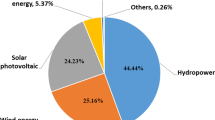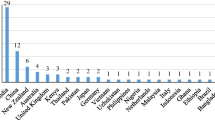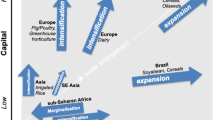Abstract
Plants are permanently impacted by their environments, and their abilities to tolerate multiple fluctuating environmental conditions vary as a function of several genetic and natural factors. Over the past decades, scientific innovations and applications of the knowledge derived from biotechnological investigations to agriculture caused a substantial increase of the yields of many crops. However, due to exacerbating effects of climate change and a growing human population, a crisis of malnutrition may arise in the upcoming decades in some places in the world. So, effective, ethical and managerial regulations and fair policies should be set up and applied at the local and global levels so that Earth may fairly provide the food and living accommodation needed by its inhabitants. To save some energy consumption, electric devices (for e.g., smartphones, laptops, street lights, traffic lights, etc.) should be manufactured to work with solar energy, whenever available, particularly in sunny countries where sun is available most of the time. Such characteristic will save energy and make solar energy-based smartphones and laptops less cumbersome in terms of chargers and plugging issues.

Similar content being viewed by others
References
Araujo, M. B., Alagador, D., Cabeza, M., Nogues-Bravo, D., & Thuiller, W. (2011). Climate change threatens European conservation areas. Ecology Letters, 14(5), 484–492.
Buzby, J. C., & Hyman, J. (2012). Total and per capita value of food loss in the United States. Food Policy, 37(5), 561–570.
Crozier, G. K., & Schulte-Hostedde, A. I. (2015). Towards improving the ethics of ecological research. Science and Engineering Ethics, 21(3), 577–594.
Doorn, N. (2015). Governance Experiments in Water Management: From Interests to Building Blocks. Science and Engineering Ethics,. doi:10.1007/s11948-015-9627-3.
FAO. (2011). Global food losses and food waste—Extent, causes and prevention, from http://www.fao.org/docrep/014/mb060e/mb060e.pdf.
Hall, R. P., Van Koppen, B., & Van Houweling, E. (2014). The human right to water: the importance of domestic and productive water rights. Science and Engineering Ethics, 20(4), 849–868.
Künnemann, R. (2006). Viewpoint: Access to food: A matter of human rights or scientific research? Biotechnology Journal, 1(4), 380–381.
Marks, S. P. (2014). Human rights and the challenges of science and technology: Commentary on Meier et al. Translating the human right to water and sanitation into public policy reform and Hall et al. The human right to water: the importance of domestic and productive water rights. Science and Engineering Ethics, 20(4), 869–875.
McLaughlin, D. W. (2011). Land, food, and biodiversity. Conservation Biology, 25(6), 1117–1120.
Moustafa, K. (2014). Synthetic sugar for sustainable power? Frontiers in Chemistry, 2, 13. doi:10.3389/fchem.2014.00013.
Moustafa, K. (2015a). Binucleation to breed new plant species adaptable to their environments. Plant Signaling and Behavior, 10(8), e1054586. doi:10.1080/15592324.2015.1054586.
Moustafa, K. (2015b). Toward breeding new land-sea plant hybrid species irrigable with seawater for dry regions. Plant Signaling and Behavior, 10(4), e992744. doi:10.4161/15592324.2014.992744.
Nahman, A., de Lange, W., Oelofse, S., & Godfrey, L. (2012). The costs of household food waste in South Africa. Waste Management, 32(11), 2147–2153.
Raymond Park, J., McFarlane, I., Hartley Phipps, R., & Ceddia, G. (2011). The role of transgenic crops in sustainable development. Plant Biotechnology Journal, 9(1), 2–21.
Ruhf, K. (2015). Regionalism: A New England recipe for a resilient food system. Journal of Environmental Studies and Sciences, 5(4), 650–660. doi:10.1007/s13412-015-0324-y.
van der Linden, E., & Foegeding, E. A. (2015). Food science needs for 2050. Journal of Food Science 80(4): iii–iv. doi: 10.1111/1750-3841.12619.
von Grebmer, K., & Omamo, S. W. (2007). Options for a rational dialogue on the acceptance of biotechnology. Biotechnology Journal, 2(9), 1121–1128.
World Food Programme. (2009). From https://www.wfp.org/content/world-must-double-food-production-2050-fao-chief.
Author information
Authors and Affiliations
Corresponding author
Ethics declarations
Conflict of interest
None.
Rights and permissions
About this article
Cite this article
Moustafa, K. Food and Sustainability Challenges Under Climate Changes. Sci Eng Ethics 22, 1831–1836 (2016). https://doi.org/10.1007/s11948-015-9737-y
Received:
Accepted:
Published:
Issue Date:
DOI: https://doi.org/10.1007/s11948-015-9737-y




